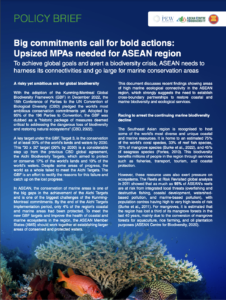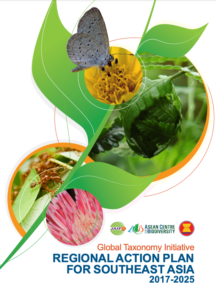To our partners and friends from the ASEAN Member States and GIZ and colleagues from the ASEAN Secretariat and the ASEAN Centre for Biodiversity—a very pleasant morning and happy new year!
After a productive discussion at our first meeting in August of last year, we are here today for a follow-up consultation on the development of the Regional biodiversity strategy and action plan (RBSAP) for ASEAN. The AMS and the ASEAN Working Group on biodiversity have agreed that developing a regional action plan for biodiversity is a fundamental need for ASEAN. It would allow us to identify shared biodiversity concerns throughout the ASEAN community that would call for region-wide collaborative action, and also aid in addressing challenges at the national level. The RBSAP will also serve as our blueprint towards the realisation of our regional biodiversity targets, while contributing to the fulfilment of the Kunming-Montreal Global Biodiversity Framework or the Biodiversity Plan.
This follow-up meeting is important for three reasons. First, we will review the proposed RBSAP developed considering your inputs from last year’s discussions. Second, we will identify priority biodiversity targets of the AMS as well as issues and concerns, and see how the ACB can support the ASEAN in achieving these common priorities. Finally, we will discuss initial preparations for the drafting of the ASEAN Joint Statement to be presented at the CBD COP 16 in October to November this year in Colombia.
During the first consultation meeting, a survey was conducted among the participants to determine which biodiversity targets are being collectively prioritised by the AMS. The results of the survey showed that there were important targets that were not receiving sufficient actions, while there were opportunities to strengthen the focus of the AMS on key targets that are already being acted upon, or jumpstart efforts linked to targets that are lagging behind. These, along with identified actions or approaches that worked and did not work in the implementation of Aichi targets, will serve as a reference for us as we finalise the ASEAN biodiversity action plan. Key steps that will be carried out until the end of this year have already been identified in the report, including this follow-up consultation meeting, and additional consultations by the second quarter of the year.
We are delighted to share that the ACB was able to advance to the second stage of the selection process for the Regional or Subregional Technical and Scientific Cooperation Centres to Support the Implementation of the KM GBF. If given the opportunity to be selected as one, this will not only accelerate the implementation of the RBSAP, but more significantly, support the AMS in enhancing their capacity to contextualise national implementation and adaptation of The Biodiversity Plan.
I look forward to seeing discussions on this follow-up meeting reflect the priority targets previously identified by the AMS such as on protected areas and the OECMs, species conservation, access and benefit sharing, mainstreaming biodiversity, ecosystem restoration, and invasive alien species. I also expect that dialogues will revolve around digging deep into the areas and approaches that worked or have been successful in the implementation of Aichi targets, and the challenges and lessons identified so that we can come up with improved multi-sectoral and cross-pillar solutions to achieve our goals and targets for the region.
Next week, the ACB will be participating in the Bern III Conference in Switzerland where discussions will focus on how synergy of actions across multilateral environmental agreements can substantially contribute to meeting the targets under the Biodiversity Plan. The said conference would be an invaluable opportunity to highlight our experiences in the ASEAN in cross-sectoral and cross-pillar collaboration given that one of the priority thrusts of the UNEP in addressing the triple planetary crises of climate change, pollution, and biodiversity loss, is strengthening the role of regional and subregional bodies and promoting partnerships with regional/sub-regional organisations.
Before I end, I thank the AMS and our ASEAN development partners such as the Federal Government of Germany through GIZ and KfW, for their full cooperation and commitment in preparing our regional biodiversity strategy and action plan. I trust that the same commitment will be given towards its implementation until it has fully accomplished its mission. As always, the ACB stands ready and able to give its support and to work across sectors to help achieve the priority biodiversity targets of the ASEAN. We are grateful for the effective ASEAN chairmanship of Indonesia last year, and we are hopeful that we can also count on the dedicated leadership of Lao PDR this year that will help the AMS gear towards enhancing connectivity and resilience in the ASEAN region, through, among others, nature-based solutions and ecosystem -based approaches.
I wish everyone a successful meeting and may we all have a great day ahead!
























